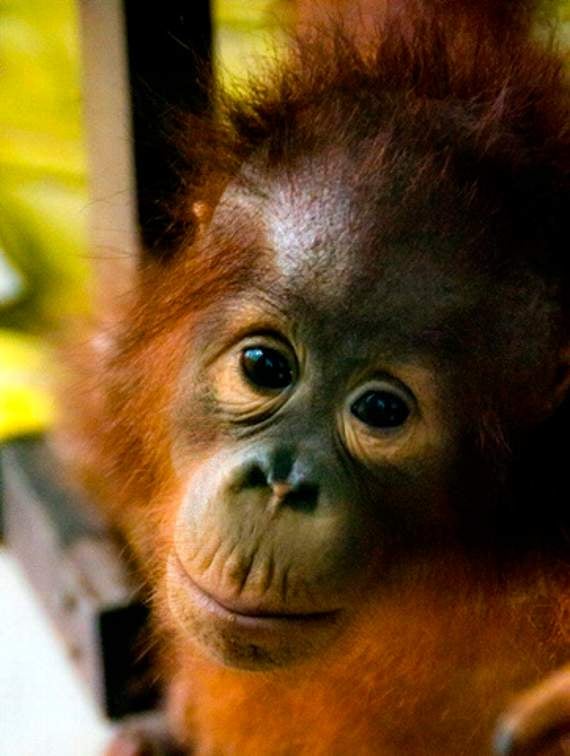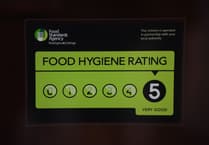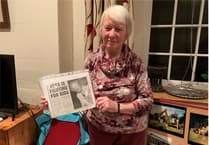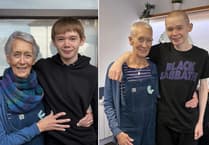TWO vets from Indonesia spent four months in UK veterinary practices last year, including Castle Vets in Launceston, as part of a new scholarship set up by a local charity.
Arga Kusuma and Pandu Wibisono travelled from Borneo and Sumatra to the UK in 2019 in order to gain an insight into the veterinary world in this country and take back new knowledge to their own countries, while also sharing their own practices and experience with UK vets.
This was made possible thanks to Nigel Hicks and his wife Sara Fell Hicks, who live in Launceston, and run the charity Orangutan Veterinary Aid (OVAID).
On Monday, January 27, Arga and Pandu were featured on BBC One’s Inside Out South West, as presenter Dr Daniel Olaiya visited the pair at Paignton Zoo, where they spent some of their time during their four-month visit, and spoke to them about their experience of looking after orangutan and coming face-to-face with tigers at home.
During the scholarship, Arga and Pandu visited Paignton Zoo, the University of Liverpool, Chester Zoo and Castle Vets in Launceston, where they were given the opportunity to learn from the vets and experts there about a variety of species, as well as improving vital skills to apply to their own work at home.
Nigel said: “Arga is from Borneo and Pandu is from Sumatra, and they both work in two separate rescue centres and came over for the scholarship. They did one week at Castle Vets, and four months in total in the UK.
“Bringing them across was a way of exchanging ideas and also for them to update their knowledge and skills.
“They spent time at Chester Zoo, Paignton Zoo — as seen on the [BBC] programme — the University of Liverpool, and Arga also spent time with a wildlife dentist from Sussex. So this was all about bringing them across to take back and share skills.”
Arga works at one of the biggest rescue centres in the area run by the Borneo Orangutan Survival Foundation, with around 350 orangutan in the centre’s care. There are just seven vets in Arga’s team, so his scholarship has enabled him to share new skills with the whole team.
Meanwhile, Pandu is the only qualified vet in his area, having graduated and gone straight to the Jantho Reintroduction Centre, which works with the Sumatran Orangutan Conservation Programme to rehabilitate orangutan in local forests. Pandu is left in charge of veterinary procedures in the centre, and if the animals become sick, he alone has to treat them. If he is unable to get on a moped, it can take approximately four hours for him to walk through the forests to access facilities to support the animals and centre.
This is why OVAID’s scholarship and funding is vitally important to the efforts being made to protect and rehabilitate orangutan in Indonesia.
Nigel and Sara fly out to these centres twice a year now, but previously they would visit once a year for six months. They attend an annual conference for orangutan vets each July in Indonesia and take in the region of 140kg of donated equipment and medicines with them. At last year’s conference they were able to meet and help 22 wildlife organisations.
Nigel said: “In the past we have had kind donors of quite expensive equipment, but if it’s not maintained it just gets put in a cupboard and set aside. For this reason OVAID always tries to provide ongoing back-up and maintenance of donated items.
“We have some connections with commercial [organisations] and can get a discount, but much of the equipment we buy is through supporters’ donations.”
Similarly, the scholarship was made possible by a generous donation. Sara said: “There was a lady in Australia who wanted to donate to help train orangutan vets. The funding was initially earmarked for an Australian charity but as they were aware of our existence and as we are the only orangutan veterinary charity in the world, the legacy was redirected to OVAID.”
“She actually donated in the region of £27,000,” Nigel added. “That will been enough to enable us to bring six vets over through the scholarship. We are bringing two vets over each year.”
Sara joked: “Arga and Pandu have been the first vets to take part in the scholarship — they have been like our willing guinea pigs!”
They said that they received an email from Arga in January, who explained that he had been part of a team examining a large male orangutan who was about to be released. However, Arga had noticed he had a broken canine and advised the team that the animal shouldn’t be released without the tooth being extracted, as it could cause his condition to deteriorate in the wild.
Arga then used the knowledge he had developed in the UK to attempt extraction of the tooth — it took half an hour, but Arga successfully extracted the huge canine to prevent it causing further problems to the orangutan.
“He wouldn’t have had the confidence to do that before the scholarship,” Nigel said. “It was nice, positive feedback to have.”
Sara said: “Some things they really need training in, and other things they don’t, but at the same time, we wanted them to come here to share knowledge as the zoo vets could also benefit. Arga and Pandu are the experts in knowing what orangutan are like in the wild.
“But they don’t seem to get the same training in vet skills as we do here. Some can qualify without even seeing an anaesthetic machine, which is scary.”
Nigel added: “If you work in wildlife medicine in Indonesia, a lot of the time you graduate and go directly to work in one of these centres and never gain other veterinary experience. So that was the idea behind the scholarship — ensuring they are able to experience different veterinary environments.
“They enjoyed their time at Castle Vets because they were part of the team and they could see the way the nurses could work to a system. A lot of what you do (as an orangutan vet) is first principle medicine. You often treat orangutan the same way as you would a dog or indeed a human.”
Between them, Nigel and Sara have years of experience in the veterinary world. Nigel qualified as a vet from Bristol University in the 70s, and went on to run his own veterinary practice in Lifton for 20 years, focusing mainly on dogs, cats, horses and cattle. On selling his practice to Castle Vets in the early 2000s, Nigel rekindled a lifelong interest in orangutan and in 2009 flew out to Borneo with a UK charity as a volunteer for six weeks.
On his return, it wasn’t long before Nigel received an email from the charity asking if he could return to continue his work there. Nigel admitted it took just two minutes to make his decision and returned as a vet for an orangutan centre in Malaysian Borneo.
Sara also shares a passion for orangutan and rainforest conservation, and in 1996 joined Nigel at his Lifton surgery as a veterinary nurse/receptionist, before also volunteering and supporting the rehabilitation of orangutan.
Nigel and Sara founded OVAID in 2014.
According to OVAID, experts predict that orangutan could be extinct in the wild in less than 25 years. The animals have lost well over 80% of their habitat in the last 20 years and in 2016 the Bornean orangutan was said to be ‘critically endangered’ by the IUCN Red List. OVAID states that western society’s ‘continually increasing demand for palm oil is fuelling the rate of deforestation in Malaysia and Indonesia’ and that Malaysia produces 41% and Indonesia 46% of the world’s palm oil.
The rehabilitation and rescue centres in Indonesia do not receive government funding, so OVAID is very much a ‘charity that helps charities’, only donating to charities out there.
Nigel said OVAID restricts itself to donations of equipment, so they know they are directly helping and supporting orangutan. He said: “We want it to be specific. That’s one way we know we can help. Because we’ve worked in the centres we know what they need.”
Nigel and Sara believe OVAID has provided approximately £200,000 worth of medicines and equipment. As part of their fundraising efforts, they also host an annual tour to Borneo and Sumatra, taking a group of supporters, who are asked to raise funds for OVAID to go on the trip, to see the work that takes place to support the endangered orangutan.
An x-ray machine can cost in the region of £40,000. New digital x-ray machines funded by OVAID have enabled vets to determine a more accurate diagnosis of orangutan conditions. They showed the Post an image of an orangutan’s leg under the old machine and then under the new x-ray machine, quite clearly showing gun pellet wounds.
Sara said: “Quite often it’s like having a mechanic with no tools. I asked one vet to show us what equipment he had and he didn’t have enough to stitch up a cat.
“This is a critically endangered species and they don’t have the equipment to save it with. That’s why we started the charity.”
OVAID relies entirely on public support and donations. To donate to the charity, go to www.ovaid.org
For more information, like the Facebook page ‘Orangutan Veterinary Aid – OVAID’ or follow the charity’s Instagram page.





Comments
This article has no comments yet. Be the first to leave a comment.